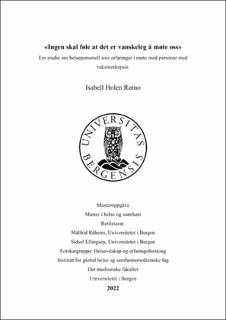“Ingen skal føle at det er vanskeleg å møte oss” - Ein studie om helsepersonell sine erfaringar i møte med personar med vaksineskepsis.
Master thesis
Permanent lenke
https://hdl.handle.net/11250/3016101Utgivelsesdato
2022-07-01Metadata
Vis full innførselSamlinger
- Master theses [138]
Sammendrag
Bakgrunn: WHO presenterte i 2019 vaksinemotstand som ei av ti globale truslar mot folkehelsa. Trass i at vaksinasjon er ein av dei mest kostnadseffektive tiltaka for å unngå sjukdom, og hindrar millionar av dødsfall, eksisterer det oppfatningar som motarbeider vaksinebruk. Med dagens pågåande Covid-19-pandemi ytrast meiningar om vaksiner, både for og i mot. Dette illustrerer tematikken sin aktualitet, sjølv om vaksinedekkinga i Noreg er god. Hensikt: Å auke kunnskap om helsepersonell sine erfaringar i møte med vaksineskepsis, og kva dei meiner er den beste måten å møte desse personane på. Problemstillingane var: 1) Kva erfaringar har helsepersonell i møte med personar som er skeptiske til vaksiner? 2) Kva meiner helsepersonell er konstruktive måtar å møte pasientar og pårørande som er skeptiske til å la seg vaksinere? 3) Kva informasjon meiner helsepersonell er den viktigaste å bidra med i møte med vaksineskepsis? Metodologisk er studien forankra i den hermeneutiske tradisjonen. Metodisk har studien eit kvalitativt forskingsdesign. To fokusgruppeintervju og eitt supplerande intervju er gjennomført. Til saman 11 deltakarar vart rekrutterte frå tre helsestasjonar, samt frå eit tilhøyrande legekontor, i ulike kommunar. Systematisk tekstkondensering er nytta som analysemetode. Resultatkategoriane frå analyse av intervjumateriale er: 1) Skepsis av ulikt opphav, 2) Omdømebygging i alt vi gjer, 3) Det faglege i sentrum. Heilt sentralt var å arbeide med omdømebygging ved å formidle oppdatert kunnskap og å ta vare på respekten og tilliten frå brukarane. Konklusjon: Helsepersonell treng oppdatert kunnskap, tillit til eige helsesystem og respekt for personen sin rett til å ta det endelege valet. Background: In 2019, the WHO presented vaccine resistance as one of ten global threats to public health. Despite the fact that vaccination is one of the most cost-effective measures to prevent disease and millions of deaths, there are perceptions that oppose vaccine use. With today's ongoing Covid-19 pandemic, opinions are expressed about vaccines, from both sides. This illustrates the topicality of the subject, even though the vaccine coverage in Norway is good. Aim: To increase knowledge about healthcare professionals' experiences in the face of vaccine hesitancy, and what they think is the best way to meet these people. Research questions: 1) What experiences do healthcare professionals have in meeting people who are skeptical of vaccines? 2) What do healthcare professionals think are constructive ways of meeting patients and relatives who are skeptical about getting vaccinated? 3) What information do health professionals think is the most important to contribute in the face of vaccine hesitancy. Methodologically, the study is rooted in the hermeneutic tradition. Methodically, the study has a qualitative research design. Two focus group interviews and one supplementary interview were conducted. A total of 11 participants were recruited from three health stations, as well as from an associated doctor's office, in different municipalities. Systematic text condensation is used as an analysis method. The result categories from analysis of interview material are: 1) Skepticism of different origins, 2) Reputation building in everything we do, 3) Research-based knowledge in the focus. Central to this was working with building the reputation by disseminating up-to-date knowledge and maintaining the respect and trust of users. Conclusion: Healthcare professionals need up-to-date knowledge, to trust their own healthcare system and respect for the person's right to make the final choice themselves. Keywords: vaccine hesitancy, vaccine resistance, healthcare professionals perspective, focus group interview, qualitative method
